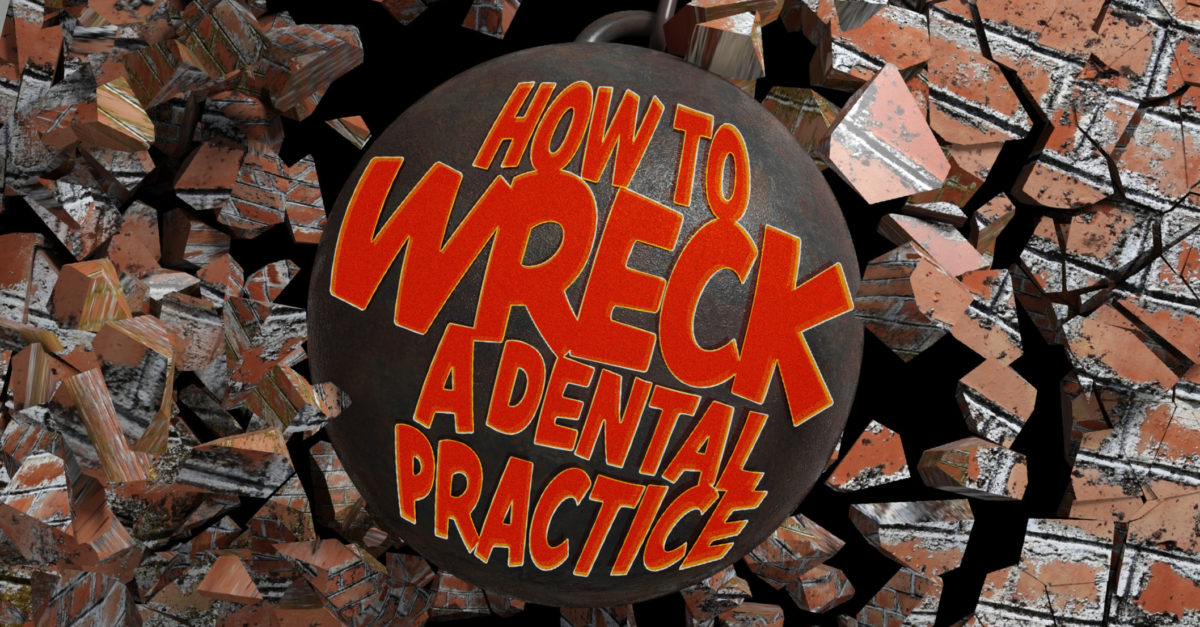Dentist and former practice owner, Stephen Hudson, discusses the most common mistakes being made by dentists that could result in destroying their own dental practice.
It’s sad to say that the external threats facing dentists at the moment are ever present and growing. So let’s look at litigation, the GDC, the economy, staff and the dentist themselves. I haven’t mentioned the CQC because I don’t consider them a threat, but an opportunity. In fact, if we look deeply, all the examples I have given contain opportunity.
So what actually destroys a dental practice?
1) Don’t save enough for tax
A classic, and it always will be a classic. The taxman has to be paid first and there is no way around this.
2) Play fast and loose with regulations
Now none of us are going to be able to meet 100% of the regulations and the guidance 100% of the time, there is just too much of it. But if you wing it, if you say, “ah it will be alright, I don’t need to worry about HTM 0105” for example, you will find yourself in a very unhappy place. Nearly 900 dental registrants faced Fitness to Practise hearings in 2017.
3) Cut the prices you charge
You cannot compete on price. Well, you can but it’s just not advisable. The patients who shop around for the best deal are not the ones you want to do business with. We often hear of retailers having ‘record sales’… and yet several months later they go out of business. Sales are not the important factor in my mind, it is the profit that matters. For example, if you slash the cost of a treatment (with a gross profit margin of around 35%) by 10%, you will need to almost double the amount you sell to make up the difference. Cutting costs means having to work harder, with more stress, just to make the same amount of money.
4) Have a really BAD management style
The authoritarian will not have as much staff loyalty as the employer who respects his work colleagues within the confines of strict expectations and boundaries. I am of the opinion (having been an employer for 16 years) that you get the staff you deserve. Your staff are either with you for a lifetime, a season or a reason. Good staff can save a struggling business. Bad staff can destroy a thriving practice…and at the end of the day, it all comes down to leadership.
5) Treat anyone who walks through the door
This is a bit controversial and many will disagree with me. However, in my mind, a lot of the people who want to join your practice just aren’t suitable. The majority of the population are decent, honest people. Some aren’t. Carefully selecting patients based on non-discriminatory guidelines reduces your risk of litigation immeasurably…unless of course you display the next factor.
6) Be the dodgy dentist
If you cut corners and don’t do your best, sooner or later that is going to come back to haunt you. Often the success of a practice will hinge on the character of the owner. As a leader, strive to set a good example to your team, always re-evaluate how you and the team are working, and always, always put the patients at the centre of everything you do
7) Don’t look after yourself
If you eat too many refined carbohydrates, drink too much alcohol and abuse other substances, you will not be 100% at work. If you don’t exercise or take time out for yourself, you will be less able to physically deal with the challenges that will face you. You can’t face the challenges life throws at you if you are tired and run down.
8) Run your legs ragged on that little treadmill of your own creation
Dr L D Pankey’s corridor of profitability research completed in the 90s showed the optimum number of hours spent chairside by a dentist should be no more than between 23-27 hours per week to sit within a ‘corridor of profitability’. Any more than that and you are doing dentistry to make a living without giving yourself the time you need to design a life and a practice worth working in. Step off the treadmill and systemise your practice so that it runs smoothly and efficiently. Everyone I’ve talked to who have cut back from five days a week to four have made the same money. When I did it, I made more.
9) Don’t prepare for the worst
Life will often hit you where it hurts multiple times. Fortunately, you can do a threat analysis and determine what the possible threats are that you face. What would your practice do if you had a stroke…would it survive? How about a gas leak? A flood? A major recession? What are your plans for these eventualities?
10) Spend more than you earn, borrow the rest and live off your overdraft
See point number 1. Whilst I’m not able to give financial advice, some would say you should be saving at least 10% of your income for your financial future, and investing it to give you a return so that eventually, you have a financial nest egg that allows you to work because you want to, not because you have to. And there you go. The thing is, any one of these can seriously harm a practice. Add them all together and you’re asking for trouble.
